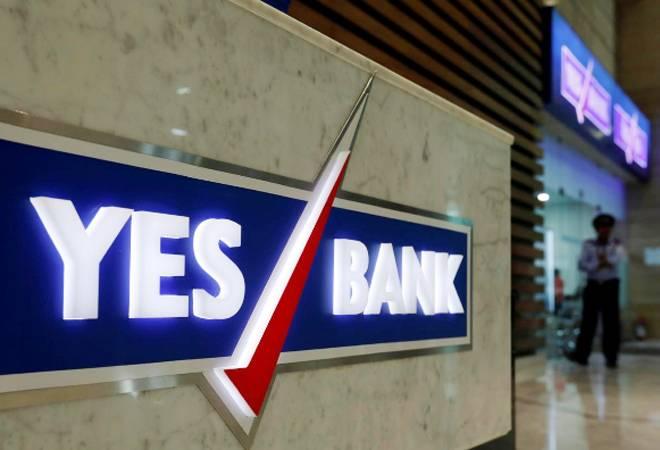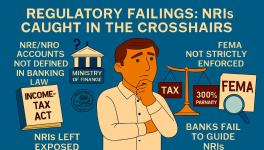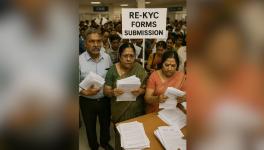Yes Bank Depositors Throng ATMs, Most Unable to Withdraw Cash

Mumbai: Harried Yes Bank depositors rushed to ATMs to withdraw cash but faced multitude of problems, including closed down machines and long queues, after the Reserve Bank of India, placed the bank under a moratorium, capping maximum withdrawals at Rs 50,000 per account for a month.
Aggravating the problems of depositors were difficulties accessing the internet banking channel, which ensured that they can't transfer the funds online as well.
At an ATM in south Mumbai's Horniman Circle, with the RBI headquarters overlooking it, the shutters were pulled down.
The guard on duty said the machine was non-operational before he reported to work late in the evening and he was ordered to shut it after 2200 hrs.
In the residential area of suburban Chembur, one ATM was dispensing cash but had a long queue of anxious depositors.
One man said it was still possible to withdraw up to Rs 50,000 in multiple transactions from the machine.
However, another machine nearby had run dry within minutes of the RBI announcement, a woman said.
The regulatory actions, undertaken by the RBI and the government, came hours after finance ministry sources confirmed that SBI was directed to bail out the troubled lender.
For the next month, Yes Bank will led by the RBI-appointed administrator Prashant Kumar, an ex-chief financial officer of SBI.
SBI Board Gives 'in-Principle' Approval for Investment
Meanwhile, public sector State Bank of India (SBI) board has given the largest lender an "in-principle" approval to invest in the capital-starved Yes Bank.
The central board of SBI discussed the matter at a meeting on Thursday, it informed the exchanges.
The announcement came hours after Yes Bank was placed under a moratorium, with the RBI capping deposit withdrawals at Rs 50,000 per account for a month and superseding its board.
"The matter in regard to Yes Bank was discussed at the meeting of the central board of bank on Thursday and an in-principle approval has been given by the board to explore investment opportunity in the bank," the SBI board informed the bourses late in the evening.
According to reports, the government has asked SBI and life insurance behemoth LIC to collectively pick up a 49% stake in Yes Bank.
Speaking in Davos, Switzerland, earlier this year, SBI chairman Rajnish Kumar said Yes Bank, which had over Rs 2 lakh crore in deposits as of September, will not be allowed to go down.
Appreciating its investments in technology, he said the bank has a strong brand.
Earlier, Kumar also suggested that Yes Bank's rival Kotak Mahindra Bank is best placed to take-over the lender.
Yes Bank's Digital Partners Like PhonePe Hit
After Yes Bank was placed under moratorium, digital payments were impacted as PhonePe, which depends on the cash-strapped lender for its transactions, could not operate.
It can be noted that the bank's own net banking facilities have not been operational since last evening. Other fintech operators who rely on Yes Bank to settle their transactions are also down.
“We sincerely regret the long outage. Our partner bank (Yes Bank) was placed under moratorium by RBI. Entire team's been working all night to get services back up asap (as soon as possible),” the app's chief executive Sameer Nigam tweeted early in the morning.
PhonePe, one of the country's largest digital payment platforms, is dependent on Yes Bank to process its transactions.
He added that the app hopes to be live in a “few hours”.
RBI Guv says Yes Bank Resolution Within 30 Day
Meanwhile, The Reserve Bank of India assured Yes Bank depositors that their interest will be fully protected and that there is no need to panic.
In Mumbai, RBI governor Shaktikanta Das said the Yes Bank resolution will be done very swiftly; 30 days is outer limit, he said.
The regulatory actions on Thursday, undertaken by the RBI and the government, came hours after finance ministry sources confirmed that SBI was directed to bail out the troubled lender.
The country's financial sector is already reeling under a spate of setbacks, starting with the high quantum of dud assets at over Rs 10 lakh crore, their slow-paced resolutions despite legal teeth through bankruptcy laws, scandals at non-bank lenders like IL&FS and DHFL, and also fraud at cooperative lender PMC Bank.
The last lender to be placed under a similar action was PMC Bank in September last year. While the withdrawal limits have been increased over time to Rs 1 lakh now, many PMC Bank depositors are still in the lurch.
There is no provision to handle insolvencies of commercial banks, and the raft of actions come even as the government is working on the FRDI (financial resolution and deposit insurance) Bill.
Just like PMC and DHFL, the RBI superseded the board of Yes Bank for a period of 30 days "owing to serious deterioration in the financial position of the bank".
The government took the decision of placing the bank under moratorium on an application made by the RBI, a gazette notification signed by Amit Agarwal, joint secretary in the finance ministry, said.
The RBI had appointed former deputy governor R Gandhi to the bank's board last year amid the leadership turmoil, caused by the central bank's August 2018 action asking co-founder and chief executive Rana Kapoor to step down by January 2019 on corporate governance concerns.
Ravneet Gill Flags Hidden Stress of Rs 10,000 Crore
The developments come exactly a year and four days after Ravneet Gill joined the lender, after leaving German bank Deutsche Bank's India operations.
Immediately on joining, Gill identified hidden stress of over Rs 10,000 crore, providing for which eroded capital buffers. The bank has been struggling to execute a capital raising plan for the last six months.
Yes Bank's core equity tier-I ratio had slipped to 8.7% as of September.
The bank had pushed its December quarter results announcement to March 14, citing hindrances it may pose to the capital raising plan.
"The Reserve Bank came to the conclusion that in the absence of a credible revival plan, and in public interest and the interest of the bank's depositors, it had no alternative but to apply to the Central Government for imposing a moratorium under section 45 of the Banking Regulation Act, 1949," an RBI statement said late Thursday evening.
It said the bank management had indicated that it was in talks with various investors and was also engaged with a few private equity firms for exploring opportunities to infuse capital.
"These investors did hold discussions with senior officials of the Reserve Bank but for various reasons eventually did not infuse any capital.
"Since a bank and market-led revival is a preferred option over a regulatory restructuring, the Reserve Bank made all efforts to facilitate such a process and gave adequate opportunity to the bank's management to draw up a credible revival plan, which did not materialise," the central bank said.
In the meantime, Yes Bank was facing regular outflow of liquidity, the apex bank said, justifying its actions.
As part of the moratorium directions, Yes Bank will not be able to grant or renew any loan or advance, make any investment, incur any liability or agree to disburse any payment, the RBI said.
However, for purposes like marriage, and health emergencies, exceptions can be made, the RBI said.
The bank will also be able to pay salaries to its over 20,000 employees and also rents, it clarified.
While Yes Bank chief executive Ravneet Gill was not reachable, calls to Shagun Kapur Gogia, the daughter of the late founder-chairman of the bank Ashok Kapur, did not elicit any response. Her family is the single largest promoter group with 8.3 percent stake in the bank.
If SBI and LIC agree to invest, this will be the first major instance in many years where a private sector lender will be bailed out using public money, with the first instance being Global Trust Bank's amalgamation with Oriental Bank of Commerce in 2003, which was followed with IDBI Bank's takeover of United Western Bank in 2010.
Get the latest reports & analysis with people's perspective on Protests, movements & deep analytical videos, discussions of the current affairs in your Telegram app. Subscribe to NewsClick's Telegram channel & get Real-Time updates on stories, as they get published on our website.
























